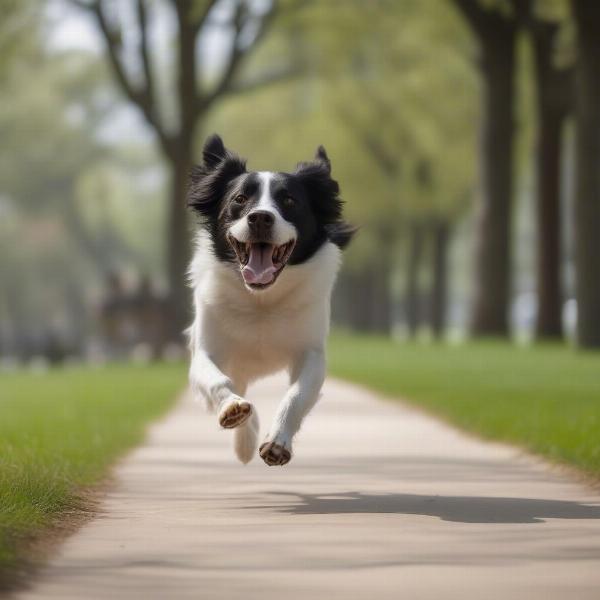Breathing is an essential function for all living beings, and our canine companions are no exception. While we often take it for granted, understanding the nuances of dogs breathing can provide valuable insights into their health and well-being. This article will explore various aspects of canine respiration, from normal breathing patterns to potential signs of underlying health issues.
Normal Dog Breathing Rates and Patterns
A healthy dog typically breathes between 10 and 30 times per minute while at rest. This can vary based on factors like breed, size, age, and activity level. Smaller dogs tend to breathe faster than larger dogs. Puppies also have a faster respiratory rate than adult dogs. It’s crucial to observe your dog’s breathing while they’re relaxed and undisturbed to get an accurate baseline. Look for a smooth, rhythmic pattern without any signs of struggle or distress.
Recognizing Abnormal Breathing in Dogs
Changes in your dog’s breathing pattern can be a sign of an underlying health problem. Rapid breathing, labored breathing, noisy breathing, excessive panting, or breathing with an open mouth (when not panting) can all indicate a potential issue. Other symptoms like coughing, sneezing, blue-tinged gums, and lethargy often accompany breathing difficulties and warrant immediate veterinary attention.
Common Causes of Breathing Problems in Dogs
Several factors can contribute to breathing difficulties in dogs. These can range from relatively minor issues like allergies or kennel cough to more serious conditions such as heart or lung disease, heatstroke, and infections. Brachycephalic breeds, with their shortened noses and airways, are particularly prone to respiratory problems.
What to Do If Your Dog Has Trouble Breathing
If you notice any changes in your dog’s breathing, it’s essential to seek veterinary care promptly. Early diagnosis and treatment are crucial for managing respiratory issues and ensuring your dog’s well-being. Your veterinarian will conduct a thorough examination and may recommend diagnostic tests such as X-rays or blood work to determine the underlying cause of the breathing problem.
Tips for Maintaining Healthy Respiratory Function in Your Dog
Maintaining a healthy weight, providing regular exercise, and avoiding exposure to irritants like smoke and dust can help support your dog’s respiratory health. Keeping your dog up-to-date on vaccinations can also protect against respiratory infections. For brachycephalic breeds, using a harness instead of a collar can help prevent airway constriction.
 Dog Breathing During Exercise
Dog Breathing During Exercise
Conclusion
Understanding your dog’s breathing is a crucial aspect of responsible pet ownership. By recognizing normal breathing patterns and being aware of potential warning signs, you can help ensure your furry friend’s respiratory health and seek timely veterinary care when necessary. Remember, changes in breathing can indicate a serious problem, so don’t hesitate to contact your vet if you’re concerned.
FAQ
- How can I tell if my dog is breathing normally? A healthy dog at rest will have a regular, rhythmic breathing pattern with a rate of 10-30 breaths per minute.
- What are some common signs of breathing problems in dogs? Rapid or labored breathing, noisy breathing, excessive panting, and blue-tinged gums can all be signs of a problem.
- What should I do if my dog is having trouble breathing? Seek immediate veterinary attention.
- Are some breeds more prone to breathing problems? Yes, brachycephalic breeds are particularly susceptible to respiratory issues due to their shortened airways.
- How can I help my dog maintain healthy respiratory function? Maintaining a healthy weight, providing regular exercise, avoiding irritants, and keeping vaccinations up-to-date can all contribute to good respiratory health.
Related Articles
- dogs breathing fast when sleeping
- prednicare dog
- nexgard spectra for dogs 3.6 – 7.5kg
- fancy dress costumes dogs
About ILM Dog
ILM Dog is your trusted international resource for all things dog-related. From breed selection and health advice to training tips and product recommendations, we are dedicated to providing comprehensive, expert guidance for dog owners worldwide. We offer specialized expertise in areas such as Dog Breeds and Selection, Health and Medical Care, Training and Behavior, Nutrition and Feeding, Grooming and Hygiene, and Products and Accessories. Contact us for all your dog-related queries! Email: [email protected], Phone: +44 20-3965-8624.